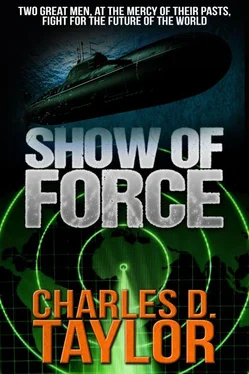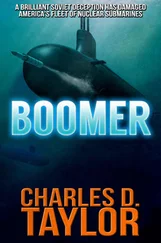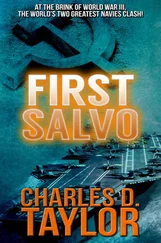Just as he had predicted to Captain Svedrov, the American aircraft first launched their long-range missiles from enough distance to protect them from shipboard missiles. Then, right behind that attack, came more aircraft with the shorter-range weapons. Their ploy was to hide behind the Harpoons, assuming the Russians had their hands full just bringing down the first flight of missiles. The less maneuverable Forgers that Lenin had launched earlier were no match for the American fighters. The Tomcats flying shotgun had been armed with Sidewinder missiles. These easily brought down most of the Soviet jets, which had been designed as bombers anyway.
The Russians' electronic deception equipment was the equal of the Americans'. The missiles fired at the Soviets had locked on the best available targets. They wanted Lenin, but only visual contact would suffice. As the second flight came in more closely with their Bullpups, they saw the destruction caused by the submarines. They had unknowingly assisted Dallas in the sinking of Nikolayev, but many of their Harpoons had been picked out of the air by antimissile fire. One had streaked in past the defenses to explode on Sevastopol, a guided missile cruiser, but now this secondary attack was necessary to inflict maximum damage.
The Bullpup missile has a range of about ten miles. The Soviet antiair missiles have a range of about fifteen miles, and the latter were fired first. The A-7 pilots spent their time evading these missiles while their men in the rear coordinated their own firing. First one, then two, then three of the attacking planes were hit. The remainder were able to complete their attack, turn, and head back for Nimitz. As they turned, two more were brought down, and a third was hit and began immediately to lose altitude, desperately struggling for that long glide toward safety.
Kupinsky watched the boards before him anxiously. Nikolayev was lost — a combination attack. One of the Harpoon missiles had exploded aboard Skory, one of his older high-speed destroyers, leaving her dead in the water. A total of twelve Bullpups were fired by the surviving aircraft.
"Svedrov. Are our destroyers using that new countermeasure equipment, the one that radiates false targets to their missile radar?"
"Yes, Admiral. Only two of the forward ships have it installed, but they are radiating now."
Kupinsky watched the progress of the American missiles, two each fired at six targets. He noted that two of them winked out seemingly before they reached the lead ship. He turned to his Chief of Staff, who smiled and nodded before his Admiral could even ask the question. The missile had convinced itself to explode on a target that never existed. The destroyer Razitelny was not so lucky. Built in the late 1970's, her captain had been personally selected by Gorenko to command this powerful little destroyer. Capable of traveling at speeds in excess of thirty-eight knots, they had felt this ship could be the prototype answer to the American high-speed attack submarines. But two missiles easily got through all the defenses, one exploding just behind the forward launcher. It detonated the missiles just then being loaded, and blew off the front of the bridge. The second hit, amidships near the waterline, exploded in the engineering spaces. Immediately she was enveloped in flames and the damage-control parties found themselves unable to control the fires.
Many of the ships were successful in exploding the missiles before they got to their targets. One hit the after launcher on Kupinsky's first surface command, Admiral Fokin, putting her stern weapons out of action. But she was still able to maintain her position in the screen. The only other missile to get through found Lenin and exploded in her starboard elevator. There was no fire, but the elevator, so important in bringing the remaining Rigas to the flight deck, was jammed in twisted metal.
"How long before that elevator can be repaired, Svedrov?" Kupinsky inquired. "If we can't have it in operation by the end of the day, I want to turn away. Their reconnaissance aircraft will easily be able to spot that hit, if the satellites haven't already photographed it."
"Commander Kalinn has reported that his damage control people will need at least twenty-four hours, sir. The hydraulics are not damaged, but metal must be cut-away and it will take time to complete repairs to make it operational again." He paused in his report, — then said, "But I wouldn't be overly concerned about their satellites, sir. We believe that Admiral Gorenko has seen to that. My assistant is checking now, but he believes a message we received an hour ago stated that our missile satellites may have neutralized theirs."
"Is there some problem with your communications?"
"Yes, sir. We aren't sure what it is, but the last messages were badly garbled, almost as if our own satellites were malfunctioning."
Kupinsky leaned back in his chair, his chin resting in his left hand, waiting for Svedrov to look up again. "Captain, I suggest you have your man try to establish direct contact with Moscow right now. It is just as conceivable for them to do the same thing to our own satellites. It is important to me and our tactics over the next twenty-four hours to determine if we are alone here or not."
Captain Svedrov, an understanding look on his face, rose immediately to join his communications staff. Kupinsky returned his attention to the boards before him. The last of the American aircraft were disappearing to the west. He had lost two cruisers, one of which was new, and two high-speed destroyers. Admiral Fokin was badly damaged, but her forward launchers were operable. One destroyer was so badly damaged by explosion and fire he would probably sink her. His own carrier was operating with only one elevator, and that meant that he would have to move the Rigas to the other side of the hangar deck if he needed them soon.
The Americans were not much better off, he noted, although the major victory had been the sinking of Virginia. A U.S. frigate and one attack sub had been sunk, and the Rigas had left four ships badly damaged, a cruiser, two destroyers, and a frigate, and John Paul Jones had been reported burning so badly that she, too, might have to be sunk.
"Admiral." It was a concerned Svedrov. "Admiral, we are unable to contact Moscow at this time. We are in the process of checking all the equipment step by step. We are not in contact with the satellites."
"Svedrov, you may let your officer make sure his equipment is in working order again, if you like. Then you can tell him to stop worrying about it. The trouble, I am sure, is in the sky, and there is little we can do about it. We are on our own for the time being." He looked first at the now-blank screens in front of him, and then back at his operations officer. "You may signal the force that we are turning to the north until Lenin is fully operational again. I want a report on Admiral Fokin. If she is unable to contribute or protect herself adequately, I want to send her to the yards for repairs. If Razitelny is as bad as I think she is, sink her. You may also schedule rendezvous with the service ships. Since we have no communications with Moscow and we can see nothing by satellite, I want you to try to contact the submarines in the American area to learn what they are doing. At this point," he grimaced, "I am operating with about the same information that our commanders had during the Great War forty years ago."
Captain Svedrov saluted him and left. The plot area was back to its normal operation status again. Few men were present in comparison to the recent crowd. What, he thought, did we accomplish today?
In his stateroom on Nimitz, Admiral David Charles stretched out on his bunk, turning off the wall light. He rubbed his eyes, and yawned, hoping he might be able to sleep for a while. But his mind was still too active. He reflected on what they had seen from the new weapons that day. Many — no, most — of them had never been used in anger before, not against ships or people. It had been awesome, really a new era that they weren't prepared for. Men on a ship never saw who or what fired a weapon at them, nor were they aware of the vehicle of their destruction. Submarines now could stand off so far that they were never known to be in the area. Aircraft and most ships launched missiles well out of visual sight. And there was no noise of action or warning of impending doom, just an explosion. The power of the new warheads was so great that there was no longer as much opportunity for a damaged ship to fight again. Most were simply destroyed. The personnel casualties were the most shocking. There were few survivors. The magnitude of the warheads saw to that. Often, ships were hit so hard and went down so quickly that there was no opportunity to search for survivors. Modern sea battle was. impersonal, even more so than they had ever anticipated. He hoped the future would bring ships requiring as few people as possible.
Читать дальше












